12 Weak Mechanical Fuel Pump Symptoms You Should Know
Your car needs a constant supply of fuel to run smoothly. It is the duty of your fuel pump to supply gas to your vehicle’s engine. Modern cars have an electric fuel pump. But vintage and older model cars having carbureted engines use a mechanical fuel pump instead.
Is it possible for your mechanical fuel pump to become weak and worn out completely? Yes, Your mechanical fuel pump is not immune to damage and may get weak and worn out due to years of non-stop service.
If you have a weak or damaged mechanical fuel pump in your vehicle then you will encounter many small to severe problems with your dream machine. So, it is absolutely necessary for you to know the symptoms of a weak mechanical fuel pump and take action immediately.
If you want to know about the possible symptoms of a weak mechanical fuel pump then read along as this article will help you know about all the possible symptoms of a bad mechanical fuel pump in detail.
How Does a Mechanical Fuel Pump Work?
Before we go ahead any further with our main discussion, let’s first have a first-hand idea of how a mechanical fuel pump works.
A mechanical fuel pump is powered either by the camshaft or a crankshaft and is usually attached to the engine. It usually works in the following way:
- There is a pivotal lever situated very close to the shaft. When the cam turns, it causes one end of the lever to go up or down.
- There is a diaphragm attached to the other end of the lever. When the lever goes up and down, the diaphragm moves with it simultaneously.
- As the lever pulls down the diaphragm, it creates heavy suction that draws the fuel into the fuel pump via the fuel pipe.
- When the lever is not being pulled by the diaphragm, it is pushed back by a spring.
- There is a one-way valve that prevents the fuel from going back again to the fuel pipe. So, the fuel is directed in one direction and that is toward the carburetor.
- Depending upon the turning speed of the shaft, the process is repeated many times each minute.
Mechanical fuel pumps have the ability to operate at a low pressure which is around 4-6 psi. The pressure is more than enough to pump fuel to the carburetor’s float bowl. Once the fuel is inside the float bowl, it is mixed with air with the help of gravity.
If you think that the fuel pump continuously pumps fuel into the carburetor then you are wrong. On the contrary, a check valve located inside the carburetor, enables fuel to enter the carburetor only when it needs fuel to operate fully.
12 Major Symptoms of a Weak Mechanical Fuel Pump
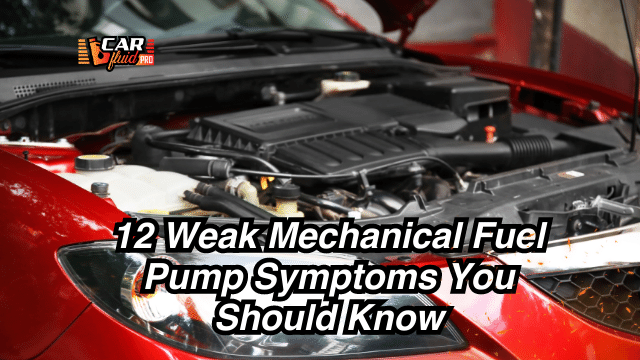
The major symptoms of a weak or faulty mechanical fuel pump are discussed in detail below so that you can spot them immediately without any hassle and take the necessary steps to solve the problem. The symptoms are:
1. Sputtering Engine
One of the major signs of a weak or bad fuel pump is that your vehicle’s engine will sputter which means it will run roughly and may also die suddenly while running.
When your fuel pump starts sputtering you should pay close attention because your engine wants to tell you something very important. Your engine starts to sputter when you hit the top speed of the engine on the highway.
The sputter indicates that your fuel is not getting enough fuel and this incident takes place when you have a clogged or a failing fuel pump. Moreover, Your fuel pump also pumps gas to meet your vehicle’s speed.
If your fuel pump fails to produce a continuous stream of gas at higher speeds, your car’s engine will sputter and will threaten to stall at regular intervals.
2. Power Loss
If you have a faulty or a bad fuel pump, your engine may not sputter but your vehicle’s engine may lose power even on certain occasions.
For example, just imagine, you are going through a really steep hill and your car’s engine suddenly loses power.
This is a clear sign that the fuel pump is not supplying enough fuel to the engine and it cannot handle the stress going up the hill.
If you test your vehicle’s limits by hard-driving or carrying extra weight you may encounter power loss. This is again a clear symptom that the fuel pump cannot fulfill your vehicle’s demand at all and your car dies while carrying heavy loads.
3. Overheating Engine
If your fuel pump starts faltering, it starts to overheat and this overheating will also cause your vehicle’s engine to overheat as well.
Pulling over is the first sign of the engine’s overheating. If the fuel pump fails to supply the proper amount of gas to the engine, the engine could be overstressed and this could cause the temperature of your engine to rise.
An overheated engine won’t run smoothly at all and it will cause your engine to stall at regular intervals.
4. Low Fuel Pressure
You should test your vehicle’s fuel pressure regularly to determine whether you have a dying fuel pump or not. You may consider buying a fuel pressure gauge from the nearest auto parts store.
Test your fuel pressure by reading the gauge. Ask a friend to help you rev the engine when you are reading the gauge. Find the recommended fuel pressure in the manual.
If you find that the fuel pressure is lower than usual, you should consider changing your fuel pump.
4. Inconsistent and Unintended Acceleration
If the right amount of fuel is not generated by the fuel pump, it may cause a car to accelerate without any input due to an excess of fuel.
Sounds strange, right? Yes, sometimes there can be excessive fuel in your fuel pump and it is caused due to a faulty fuel pump.
When the fuel pump sends too much fuel to your engine, you will notice your engine surging and when this happens, it makes driving really dangerous.
Surges indicate the vehicle picks up speed and then drops the speed suddenly. This doesn’t look too good on the road.
If there are ups and downs in the fuel flow, it can cause power surges. In this case, the vehicle will want to accelerate and then slow down and again accelerate. This happens again and again and becomes quite risky on a crowded road.
5. Mileage Decreases
If you notice that your vehicle is taking out more gas than usual, it means that your fuel pump may be damaged and sending too much fuel to the fuel pump than it usually does.
Again, if the relief valve is not close to stopping the flow of the fuel, you will notice a significant amount of decrease in your vehicle’s overall mileage.
Therefore, You should constantly keep an eye on your vehicle’s mileage to see whether it is decreasing or not. If it falters then you should start taking steps to replace your faulty fuel pump.
6. Difficulty in Starts
One of the main symptoms of a weak or faulty mechanical fuel pump is that it will fail to produce and deliver the right amount of gas to the engine. Thus your vehicle will face difficulty in starting up.
Your vehicle will be starved of gas as the fuel pump won’t be able to generate enough fuel for the engine. So, you should take the necessary steps if this happens to your vehicle.
7. The vehicle Won’t Start
There are many factors responsible for this problem but when this happens you should check your vehicle’s fuel pump first and see if it has become damaged or not.
A weak or bad fuel pump will fail to supply any fuel to the engine. As a result, your vehicle’s engine will starve of sufficient gas and won’t get started at all.
8. Engine Misfires
A lack of fuel in the engine may cause your engine to misfire which may eventually damage your vehicle’s engine altogether.
So, to prevent this from happening you should take serious steps to correct your clogged-up fuel pump because it is the only culprit to cause this problem in the first place.
9. Check Engine Lights Comes On
The glowing “check your engine light” will flash on if there is some trouble with your vehicle’s fuel pump.
When there is a faulty fuel pump, your vehicle will start acting abnormally and will cause many unpleasant issues with your vehicle.
These unpleasant issues trigger your vehicle’s check engine light to let you know that you must act immediately to solve the problem.
10. Excessive Noise
If you start hearing abnormal sounds coming directly from your vehicle’s engine department then rest assured that your vehicle’s faulty fuel pump may be held responsible for this.
11. Unusual Vibration
The vibration occurs when there is a shortage of fuel in your car’s engine. A bad or damaged fuel pump fails to generate the right amount of fuel for the engine resulting in an unusual vibration when you drive your vehicle.
How to Replace a Weak Mechanical Fuel Pump?
It is not possible to troubleshoot your weak or faulty mechanical fuel pump. Replacing them is the only option that you can take. The replacing process is a fairly easy one and you can do it all by yourself by following these simple steps:
- Use a screwdriver and remove the inlet line first. Fuel will run out from this line so be sure to cap the line using a clamp. Use a safe container to capture any fuel leaked out from the pump.
- Next, remove the outlet line very carefully. Use a backup wrench to avoid damaging the fittings.
- Remove the bolts that hold the pump to the blocks. Take out the damaged mechanical pump and dispose of it.
- Take the new fuel pump and apply a slight coat on one side of the gasket. This will allow your gasket to stick firmly to the engine block.
- Remove any old gasket that is stuck to the engine block to get a proper seal.
- While installing the new pump make sure to set the pump arm firmly into the cam loop. Set the mounting bolts tightly.
- Re-install the outlet line. Use two separate wrenches while tightening the fittings.
- Use a hose clamp to re-install the inlet line.
There you go then. If you can follow these simple steps and act accordingly, you will be able to replace your broken mechanical fuel pump in a jiffy.
Frequently Asked Questions
Carburetor car owners and vintage car lovers ask these questions quite frequently:
Is It Possible to Clean a Mechanical Fuel Pump?
Yes, it is very much possible. You can wash all the parts using clean petrol and a thin paintbrush.
How Can You Test a Mechanical Fuel Pump?
Yes, you can do it very easily. First, take an empty 12-ounce soda bottle so that you can collect fuel samples while your friend cranks the engine for 30 seconds. If the mechanical fuel pump pushes four to six ounces of gas into the bottle, your mechanical pump is working just fine.
Is It Possible for a Mechanical Fuel Pump to Its Prime?
If you have a carbureted car with a mechanical fuel pump then it is possible for you to face priming issues.
How Long Does a Mechanical Fuel Pump Last?
A mechanical fuel pump usually lasts for 100,000 miles or more.
What powers a Mechanical Fuel Pump?
A mechanical fuel pump is usually powered by the camshaft or by a special shaft which is again driven by the crankshaft.
There you have it. I have discussed every single symptom of a weak mechanical fuel pump in detail. Hopefully, this article will help you immensely to identify those symptoms and take action immediately to enjoy safer and smoother rides on highways.
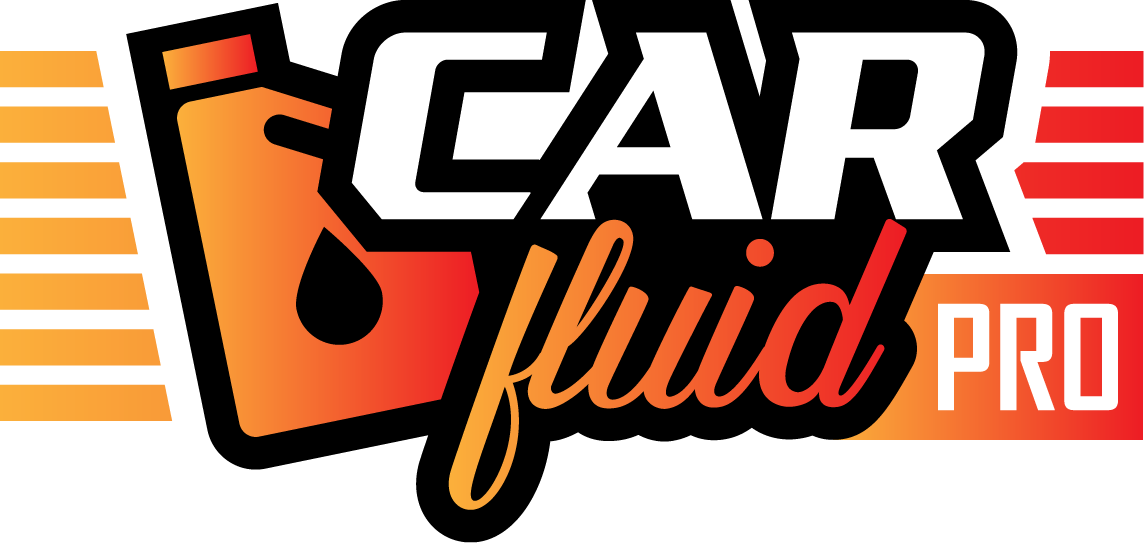
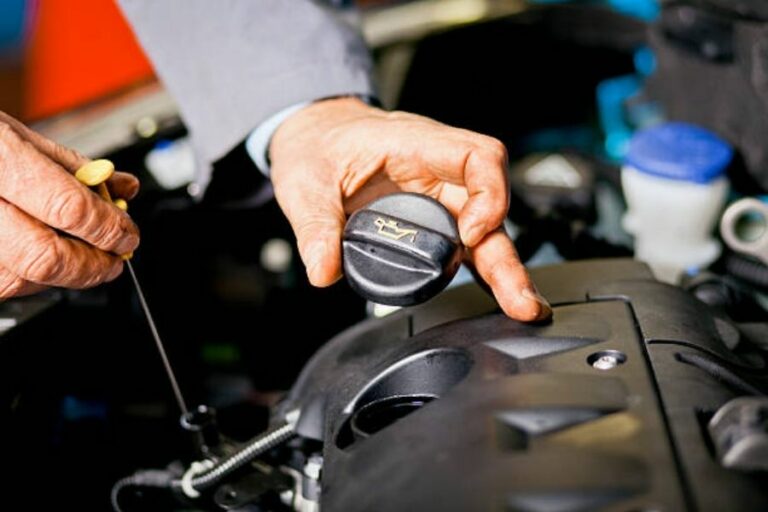
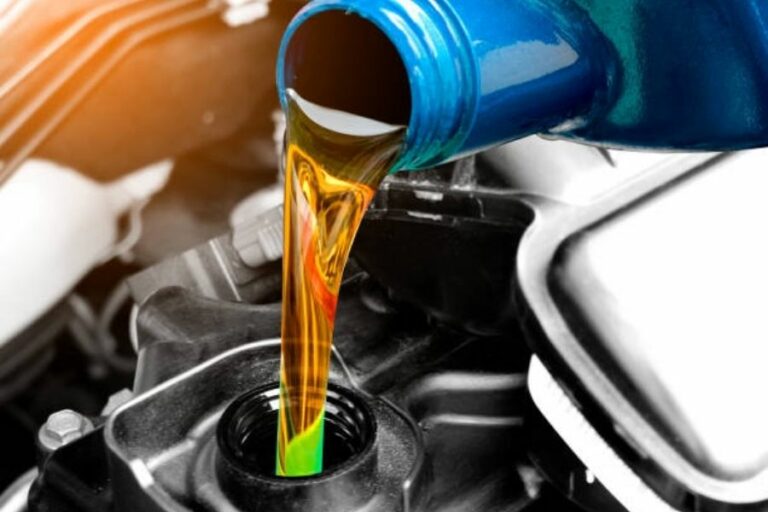
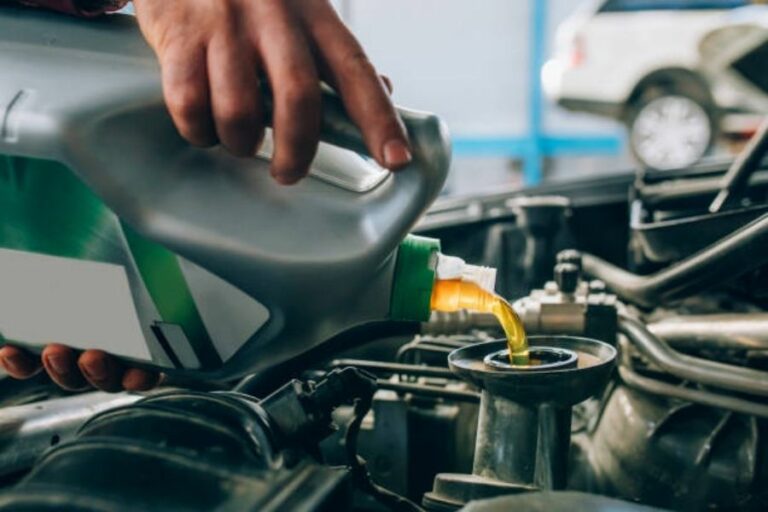
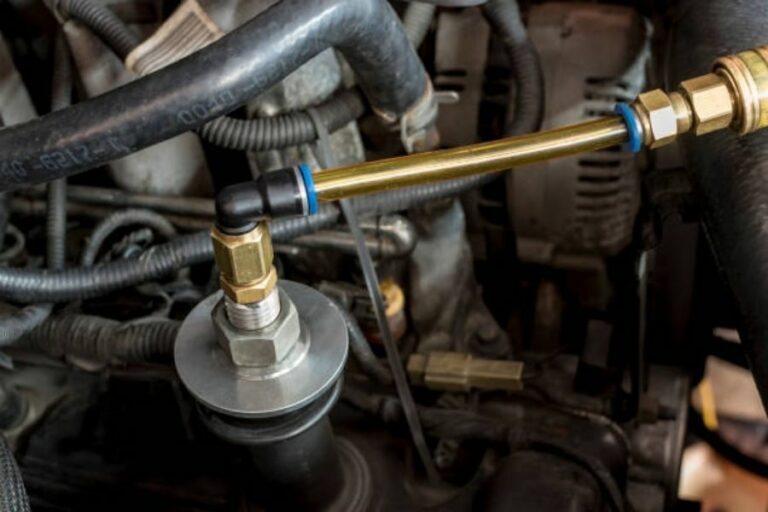

![Why does the gas pump stop when my tank isn’t complete [Answered]](https://carfluidpro.com/wp-content/uploads/Why-does-the-gas-pump-stop-when-my-tank-isnt-complete-Answered-768x512.jpg)